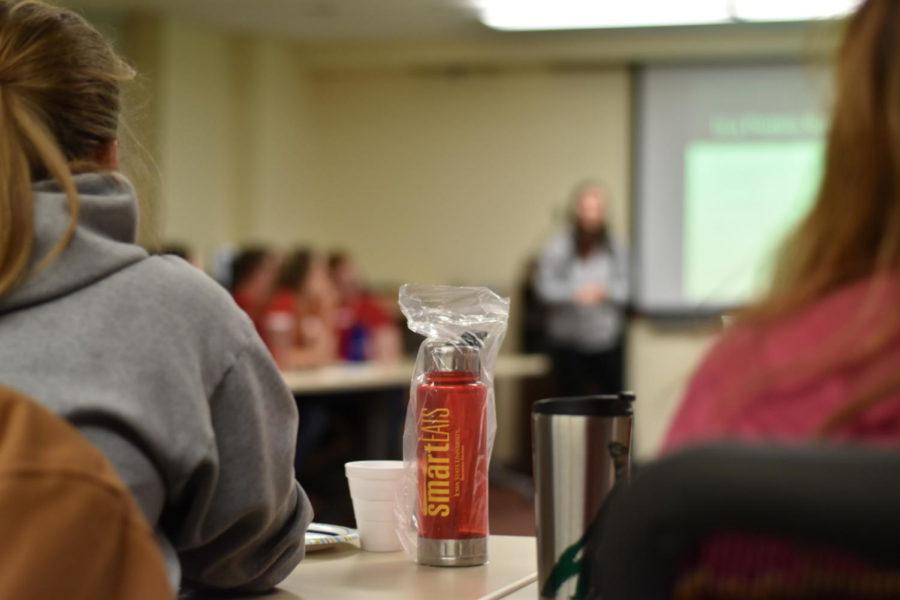Smart Eats hosts workshop on how to eat healthy while in college
The Smart Eats Workshop, hosted in State Gym on Tuesday, showcased various facts, recipes, and information on nutrition from veteran Dietetic students. They hope to host another session later this semester.
February 13, 2018
Fourteen participants gathered in the State Gym conference room this evening for a Smart Eats workshop hosted by Recreation Services designed to help students eat healthy in college.
As students arrived, snacks, water bottles, recipes, and informational sheets were available to them.
The session opened with recipes to make roasted beet hummus, strawberry smoothies and raspberry dark chocolate bark. The Rec Services staff then dove into topics on eating healthy. These included the difference between serving size and portion size, principals of intuitive eating, what to eat before and after a workout, protein supplement usage and smart shopping.
Abbie Portz, a sophomore in agronomy, said she appreciated the protein discussion because it was an area she didn’t know much about.
During the session, the staff hit the protein topic from a number of different angles. The recommended daily allowance for meat is 3 oz. which is about the size of a deck of cards. However, portion sizes can be 6 to 10 oz. at restaurants.
Another staff member mentioned that our bodies can only metabolize approximately 30 grams of protein in an hour. Many people greatly exceed this amount, and think they need to be taking in very large amounts of protein. However, the extra protein is either excreted out, stored as fat or burned as energy.
The recommended daily allowance for protein is .8 grams per kilogram of body weight for sedentary individuals (individuals with low amounts of exercise). For athletes, the recommendation is between 1.2 to 2 grams per kilogram of body weight.
Generally speaking, this amount can be met through meals people eat throughout the day. The staff said protein supplements are usually not necessary, but they can be convenient.
One participant asked about how a vegan diet might influence a healthy protein intake. Mitch Zaplatosch, one of the founders of Smart Eats, said he thought a vegan diet is beneficial for someone who doesn’t eat many fruits and vegetables; the nature of a vegan diet generally will increase intake. As far as protein is concerned, he said it is more difficult to get all amino acids in, but it is do-able by combing different sources.
Another topic the staff covered was intuitive eating, a strategy developed by two dieticians. The practice has 10 main principals: reject the diet mentality, honor your hunger, make peace with food, challenge the food police, respect your fullness, discover the satisfaction factor, honor your feelings without using food, respect your body, exercise and feel the difference and honor your health.
The main premise was to find sustainable ways to eat that are beneficial for the body without making food a source of guilt. Diets can result in “weight cycling” where weight is lost and gained repeatedly.
“I like that they clarified diets are not always useful,” said Kourtney McKinnon, a sophomore in finance.
This method emphasizes eating in response to your body’s internal cues. If you are hungry, it is not a bad thing to eat. If you’re not hungry or full, it is okay to stop or refrain from eating.
Another point the staff made was that eating should be pleasurable and there are ways to eat healthy without counting every calorie or outlawing foods that lead to cravings, guilt, and over-eating. The intuitive eating portion of the presentation was closed with a reminder that learning to eat intuitively is a process and to be patient while making improvements.
Other tips the staff offered focused ways to shop smart. Their recommendations were to take an inventory of groceries you have, make a list, shop on sale, compare prices, buy in bulk, choose foods that can be used in different ways, and buy canned and frozen fruits and vegetables to save money and prevent waste.
“Overall it was a good experience. I got a lot of new information,” Portz said.
Smart Eats has a presence on Facebook and Instagram, and you can also request a half-hour orientation session with the Smart Eats Staff on their website.







